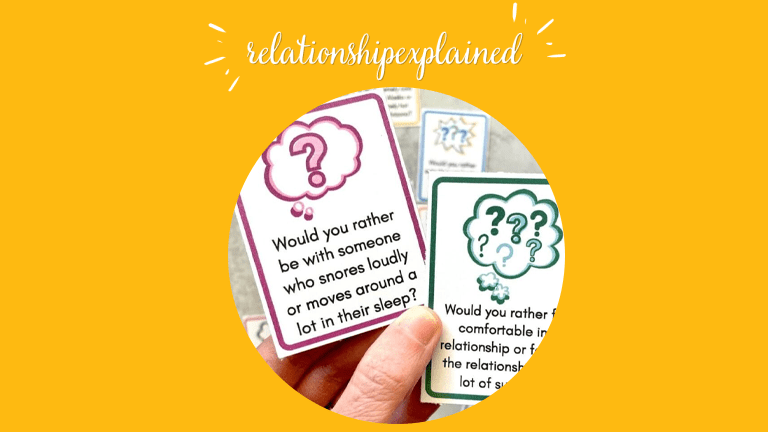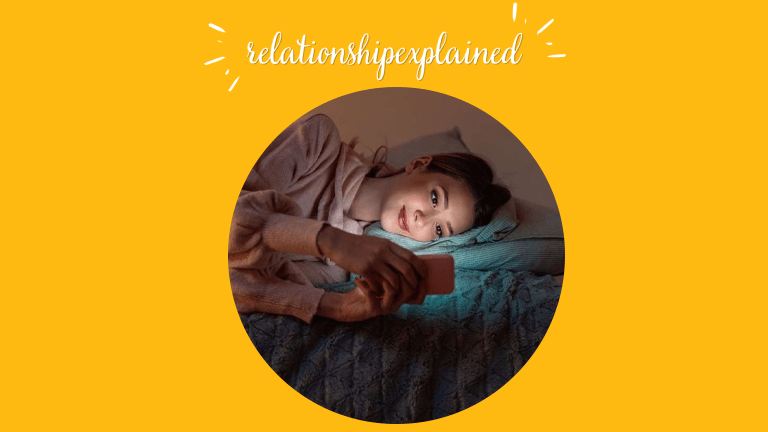Why Does He Eavesdrop On My Conversations?
Wondering why your partner may eavesdrop on your conversations? Learn the telltale signs of eavesdropping, the many reasons behind it, and how to handle it in a relationship.
In the realm of relationships, trust is a cornerstone upon which the foundation of a relationship is built.
It's the glue that holds two people together, fostering intimacy and emotional connection. However, when one partner starts eavesdropping on the other's conversations, it can shake the very core of that trust.
In this article, we delve into the many reasons behind the guy-eavesdrop problem, its impact on relationships, and how to handle it when it starts happening.
The Signs of Eavesdropping
Eavesdropping can manifest in various ways, as detailed below.
1. Overhearing Conversations
One common sign of listening in is when you notice that your partner seems to overhear your private conversations more often than you'd expect. It's like they have a super-sensitive hearing when it comes to your chats.
For example, you might be having a conversation with a friend on the phone in another room. And somehow, your partner seems to know exactly what you talked about even though you never mentioned it to them. This can help you realize that they've been listening in.
2. Sudden Interest
Another sign to watch out for is when your partner suddenly becomes unusually interested in your phone calls or messages. They might start asking questions about who you talk to, what you talk about, or even request to see your messages.
It's like they've developed a newfound curiosity about your talking points, which can be a hint that something's up.
3. Frequent Accidental Encounters
Have you ever noticed that whenever you're having a private conversation with someone, you seem to bump into your partner unexpectedly?
It's almost like they magically appear during every moment you spend talking to someone else. This frequent "accidental" encounter might not be so accidental after all. It's a sign that they might intentionally attempt to listen in on your conversations.
4. Knowing Too Much
Lastly, if your partner often brings up specific details from your conversations that you haven't shared with them, it can be a clear indicator of eavesdropping.
You might wonder how they knew about something you only discussed with your friend circle or family. This is because they've been gathering information and trying to get an idea of the conversation topics by eavesdropping on your private talks.
3 Reasons Behind Eavesdropping
Eavesdropping often stems from complex emotions and motivations. To effectively deal with it, it's essential to get an idea on why your boyfriend might engage in this behavior.
1. Curiosity
Curiosity is a fundamental human trait. People are naturally curious about the lives of those close to them. When your partner eavesdrops out of curiosity, it may not necessarily be malicious. They might just want to have the knowledge, even if it's about something you consider private.
2. Insecurity
When a guy eavesdrops, insecurity can be a driving force behind it. If your partner feels uncertain about your feelings or fidelity, they may resort to listening in as a way to reassure themselves. It's a coping mechanism that stems from their own self-doubt.
3. Lack of Trust
Perhaps the most concerning reason behind eavesdropping is a lack of trust in their life as a couple. When trust erodes, individuals may feel compelled to eavesdrop or use a recording device as a way to uncover potential betrayals or secrets. It's a damaging cycle that can further erode trust if not addressed promptly.
The Impact of Eavesdropping
Eavesdropping isn't a harmless act; it can have severe consequences on a relationship. Let's explore how it can affect both partners.
1. Breach of Privacy
Imagine you have a personal diary with your thoughts and feelings, and someone sneaks in to read it without your permission. That's what eavesdropping can feel like – a breach of privacy. In a relationship, trust and respect are like the foundation of a sturdy house. When listening in happens, it's like a bulldozer crashing into that foundation.
Trust is built on the belief that your partner will respect your boundaries and privacy. When those boundaries are crossed, trust can crumble like a house of cards. Rebuilding trust after an invasion of privacy can be incredibly challenging. It's like trying to put those scattered cards back together; it takes time, effort, and sometimes, it never quite feels the same again.
2. Communication Breakdown
Conversation is like a bridge that connects two people in a relationship. It's how you share your thoughts, feelings, and experiences. When eavesdropping becomes a frequent issue, it's like putting up a big roadblock on that bridge.
The person who's been eavesdropped on might start feeling guarded. They become cautious about what they say because they're afraid of their words being used against them or shared without their consent. This guardedness leads to a lack of openness and emotional intimacy, which are essential for a healthy relationship.
Just like a bridge needs to be clear and open for people to cross it, the ability to speak freely needs to be open for a relationship to thrive. Eavesdropping creates barriers, making it harder for partners to connect and become aware of each other’s intentions.
3. Emotional Consequences: Hurt And Resentment
Eavesdropping isn't just a breach of trust and privacy; it also stirs up a whirlwind of emotions. The person who's been eavesdropped on often feels hurt, betrayed, or violated. It's like a deep emotional wound that takes time to heal.
On the other hand, the person doing the eavesdropping may carry a heavy burden of guilt or worry. They know they've done something that's hurtful and wrong, and this knowledge can eat away at them.
These strong emotions can create a toxic environment in the relationship, leading to a cycle of hurt and resentment. It's like a storm cloud that hangs over the relationship, making it hard to see the sunshine of love and happiness.
Handling Eavesdropping In A Relationship
Dealing with eavesdropping requires sensitivity, empathy, and effective communication. Here are some strategies to consider when faced with this issue.
1. Open Communication
Open and honest communication is the bedrock of resolving any relationship problem, including listening in. Both partners must create a safe and welcoming space to share their thoughts and feelings. Here's how this might work:
A. Sharing Reasons
If you're the eavesdropper, it's crucial to explain why you've been doing it. Maybe you felt insecure or curious, but sharing these many reasons can help your partner understand your perspective.
B. Expressing Feelings
On the other hand, if you've been eavesdropped on, share how it makes you feel. Be honest about the hurt or discomfort it has caused. This helps your partner understand the impact of their actions.
Open communication allows both partners to see each other's viewpoints and emotions, which is essential for finding common ground.
2. Setting Boundaries
In any healthy relationship, setting clear boundaries is vital. Both partners should come together to define what constitutes a private conversation and what's open for sharing. This discussion helps establish limits that everyone agrees on, which can help prevent future eavesdropping incidents.
For example, you might decide that conversations with close friends are private, but you're open to discussing conversations with family members. These boundaries provide a clear framework for respecting each other's space and privacy.
Remember, setting boundaries is not about hiding things from your partner; it's about respecting personal space and creating a sense of security within the relationship.
3. Rebuilding Trust
After an incident of eavesdropping, trust can be damaged. Rebuilding it is a journey that requires patience, time, and consistent effort from both partners. Here's how you can start the process of rebuilding trust:
A. Trust-Building Activities
Engage in activities that build trust gradually. This might include being more open about your daily activities or making an effort to spend quality time together.
B. Open Communication Continues
Keep the lines of communication open. Regularly check in with each other to share your thoughts and feelings. This ongoing dialogue can help rebuild trust over time.
C. Acts Of Transparency
Be transparent about your actions and intentions. If you're the one who eavesdropped, make an effort to show that you're committed to change and improving the relationship.
When Eavesdropping Becomes a Bigger Issue
In some cases, eavesdropping may become a recurring problem where paying attention is key.
1. When It's a Pattern
When a guy eavesdrops, it may become a chronic behavior in some instances, indicating deeper issues within the relationship. Seeking professional help, such as couples therapy, can be beneficial in addressing why the guy eavesdrops.
2. Seeking Professional Help
A relationship counseling office can provide a safe and structured environment for both partners to discuss their feelings and realize the eavesdropping mistake. They can address underlying issues, hear each other out, and work towards healthier talking and listening habits as well as trust.
Final Thoughts
Eavesdropping on a partner's conversations can be a challenging issue to navigate in a committed life.
Often, a guy eavesdrops out of curiosity, insecurity, or a lack of trust born of the standards set by modern society. But it can have detrimental effects on trust, communication, and emotional well-being.
By paying attention, recognizing the signs, understanding the motivations, and taking steps to rebuild trust and set boundaries, couples can address this issue constructively and strengthen their bond.
In cases where guy-eavesdrop instances become a recurring problem, seeking professional help through relationship counseling can be a valuable step towards healing and resolving deeper issues. Ultimately, talking openly and mutual respect are key to maintaining a healthy and trusting relationship while preventing it from becoming worse.













